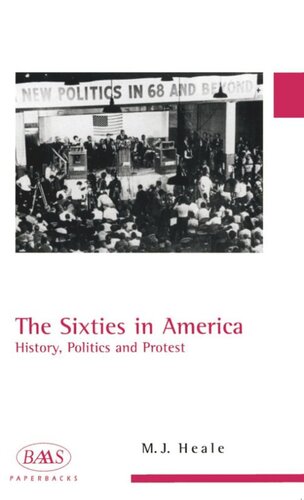

Most ebook files are in PDF format, so you can easily read them using various software such as Foxit Reader or directly on the Google Chrome browser.
Some ebook files are released by publishers in other formats such as .awz, .mobi, .epub, .fb2, etc. You may need to install specific software to read these formats on mobile/PC, such as Calibre.
Please read the tutorial at this link: https://ebookbell.com/faq
We offer FREE conversion to the popular formats you request; however, this may take some time. Therefore, right after payment, please email us, and we will try to provide the service as quickly as possible.
For some exceptional file formats or broken links (if any), please refrain from opening any disputes. Instead, email us first, and we will try to assist within a maximum of 6 hours.
EbookBell Team

4.4
102 reviewsNo other decade of the twentieth century has acquired the mythological status of the 1960s. For the United States this was the decade of the Camelot presidency of John F. Kennedy and the ruined presidency of Lyndon Johnson, of the great civil rights March on Washington and the assassination of Martin Luther King. It was the decade of the escalating war in Vietnam and the thrusting youth and peace movements, of urban riots and violent confrontations on the street. These years also witnessed the birth of the New Left on the one hand and the angry conservatism of Barry Goldwater and George Wallace on the other, as well as a determined political activism that ranged from the atrocities of the Ku Klux Klan to the demonstrations of a revived women's movement.
In all, the 1960s were central to the great transformation which American society underwent in the half-century after 1945 and the strains associated with this largely explain the turbulence of these years. This period was a watershed in twentieth-century American history and the roots of contemporary America are to be found in this decade.
Focusing on the public affairs of America, Michael Heale introduces the reader to the major changes which governed life in the sixties. Economically America saw the move from an 'industrial' to a 'post-industrial' society while in political terms there was a parallel change with the collapse of the New Deal political order and the transition to a divided system of politics. The optimistic leadership of John F. Kennedy and Lyndon Johnson was supplanted by the suspicious conservatism of Richard Nixon. Finally it was in the 1960s that the global role of the USA was first called seriously into question: the country's relatively benign image became malign as Vietnam exposed the imperialist, racist and capitalist aspects of American power.
The book examines the 1960s in this context - as a decade caught between one America and another.
Key Features